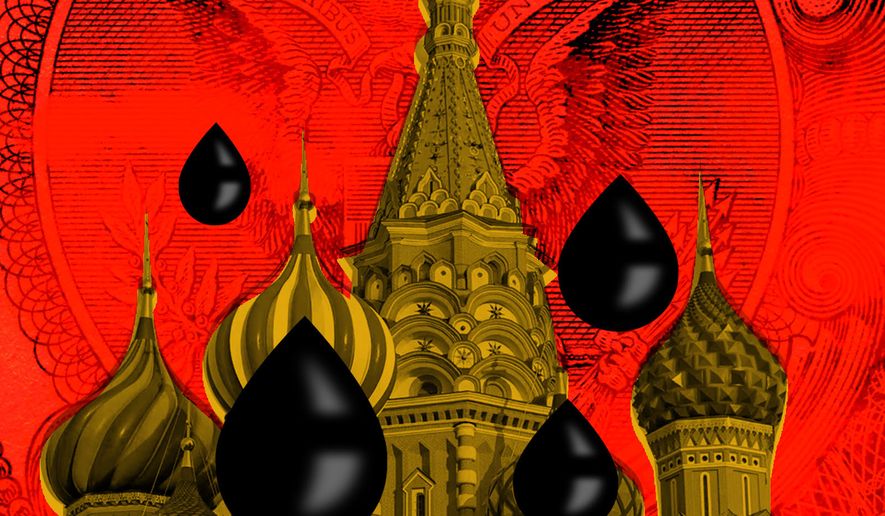A version of this story appeared in the daily Threat Status newsletter from The Washington Times. Click here to receive Threat Status delivered directly to your inbox each weekday.
OPINION:
President Trump has, at long last, lost patience with Russian ruler Vladimir Putin. He said, “Every time I speak with Vladimir, I have good conversations and then they don’t go anywhere.” Given Mr. Putin’s KGB history, that is no surprise.
The best evidence of the president’s loss of patience is threefold. Mr. Trump has said that further discussions with Mr. Putin would be useless. He also gave Ukraine permission to use long-range weapons, such as Britain’s Storm Shadow missile, to strike at Russia, and last week imposed sanctions on Russia’s two biggest oil companies, Rosneft and Lukoil, which account for about 50% of Russian oil exports.
The global price of oil increased by about 5% after Mr. Trump’s announcement, which is not a significant change. The only real question is how effective the sanctions will be on China and India, which import about five out of six barrels of Russian exported oil. (Turkey is the third-largest importer of Russian oil.) The sanctions won’t have any effect on China because it has no desire to make peace with the U.S. or Mr. Trump. Yet India, which wants a more reliable relationship with Mr. Trump, may also want to reduce its Russian-imported oil. Turkey won’t change its relatively pro-Russian policy.
According to a Wall Street Journal report, Mr. Trump’s advisers gave him three choices to sanction Russian oil. The choices were between sanctioning Russian leaders and Russian industry, targeting the Russian oil industry, and even weaker, more limited options. The president chose the middle ground. Mr. Putin said the sanctions were “an unfriendly act” and that no country could bow to them. Nevertheless, he hasn’t reacted further, though Russian attacks on Ukraine have greatly increased in the past few weeks.
China and India have until Nov. 21 to change their arrangements for importing Russian oil. Neither is likely to make those changes because there are few other sources. Neither wants to be, and China cannot afford to be, dependent on the U.S. for oil.
Mr. Trump has been exceedingly patient with Mr. Putin. He has held off on his threats of sanctions for months. Moreover, he has refused to send Ukraine the Tomahawk long-range cruise missiles that Ukrainian President Volodymyr Zelenskyy wants. Mr. Trump was probably dissuaded from doing so by a Russian statement that a nuclear-armed Tomahawk looks the same in flight as a conventionally armed one.
Mr. Trump has few choices with respect to forcing an end to the Russian war on Ukraine. He could sanction the Russian “oil-igarchs” personally as well as their companies, but that would probably have as little effect as the sanctions he has already imposed. He certainly won’t sanction Mr. Putin, with whom he still thinks he has a good relationship, despite all other indications.
Mr. Trump could hold NATO’s feet to the fire — meaning Turkey’s — on importing Russian oil, which would probably have no effect because Turkey is our most unreliable NATO ally.
For Mr. Trump to gain ground in the Russia-Ukraine war, he will have to be much tougher with Mr. Putin, but he has little leverage to do so. Aside from economic sanctions, which he could make much tougher, Mr. Trump has little or no chance of making the war too expensive for Mr. Putin. Mr. Trump could cut off the Russian oil companies, or even the nation, from the international banking system, but that would be a last step short of war.
Mr. Zelenskyy also needs to make the war tougher on Mr. Putin, and he has ways to do so. Ukrainian strikes on Russian oil refineries and depots could, gradually, make Mr. Putin’s support of the war more difficult. Still, that would almost certainly take more time than Ukraine has.
Despite all Mr. Zelenskyy’s toughness, he has to rely on NATO for support. He cannot win the war, but he might be able to make it too expensive for Mr. Putin to sustain.
One way to achieve this would be to emphasize the targeting of longer-range munitions at Russian troop concentrations. Although the Tomahawk missile carries a 1,000-pound warhead, the British Storm Shadow missile carries one almost as heavy. However, targeting troop concentrations, if they exist, would be dependent on U.S. and British intelligence, primarily satellite intelligence. Missile barrages on such sites also depend on the availability of missiles.
Russia’s war against Ukraine has become one of attrition in which Russia can almost certainly outlast the nation it attacked. How much time does Ukraine actually have to defeat Russia or make the war unsustainable?
That will depend on Mr. Putin’s resolve. So far, he has not shown any diminution of his desire to conquer Ukraine.
• Jed Babbin is a national security and foreign affairs columnist for The Washington Times and a contributing editor for The American Spectator.




Please read our comment policy before commenting.